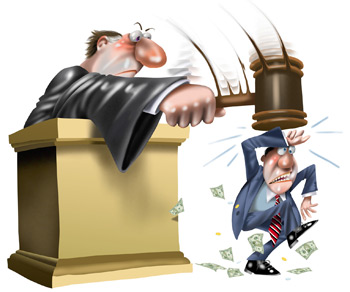The U.S. Tax Court
 The best defense is a strong offense. Taxpayers involved in transactions that necessitate a business valuation must be appropriately prepared to withstand an IRS challenge.
The best defense is a strong offense. Taxpayers involved in transactions that necessitate a business valuation must be appropriately prepared to withstand an IRS challenge.
Over the past few years, U.S. judges have substantially increased their knowledge of valuation methodology and application. This is especially true of Tax Court judges. In 2005, the Honorable David Laro, a U.S. Tax Court judge, co-authored a book with the “father of business valuation, ” the highly respected Dr. Shannon Pratt, on the subject of business valuation and taxes. More frequently, Tax Court judges are applying their valuation knowledge to better scrutinize taxpayer testimony for, among other things, lack of a professionally prepared appraisal, misapplication of valuation theory, lack of a credible expert witness and lack of expert independence.
To understand Tax Court decisions, insight on the process of federal tax litigation and value determination is useful. The U.S. Tax Court has national jurisdiction over income, estate, gift, generation-skipping transfer taxes, and other federal taxation issues. It has 19 judges who are appointed by the President and the Senate. The Internal Revenue Service is a bureau of the Department of the Treasury (the Treasury), and conducts an examination of (audits) all taxpayer returns.
Upon the death of a taxpayer, estate, gift and other taxes may be imposed on the decedent’s taxable estate. The audit determines if the estate tax return undervalues the decedent’s property, which includes ownership of a business and results in an underpayment of taxes due. If the Service determines an underpayment exists and a resolution with the taxpayer cannot be reached, the Commissioner of the IRS (the Commissioner) issues a “Notice of Deficiency.” In a word, this is BAD: if a notice is issued, it means the Commissioner intends to proceed to court and the taxpayer bears the burden of proving the IRS is wrong. In Tax Court, the Commissioner is always the defendant and the plaintiff is the taxpayer who must petition the court to re-determine the IRS’ presumption of deficiency.
Fair Market Value is the exclusive determination of value for federal tax purposes. Other standards of value may be applied for nontax purposes, including: investment value, intrinsic value, synergistic value, market value, transactional value, etc.
The Internal Revenue Code (the Code) is the primary source of tax law and contains code sections that are created by Congress. Although there are approximately 240 sections within the Code that require a determination of fair market value to assess tax liability, it does not define it. Fair market value is defined within the Treasury Regulations (the Regs), which like statutes enacted by Congress, have the full force of the law. Regulation section 20.2031-1(b) defines fair market value as:
The price at which the property would change hands between a willing buyer and a willing seller when the former is not under any compulsion to buy and the latter is not under any compulsion to sell, both parties having reasonable knowledge of relevant facts.
The Treasury issues Revenue Rulings and Revenue Procedures, which are announced positions of the IRS. Revenue Ruling 59-60 is a widely recognized ruling and provides eight “rules” on valuing stock or ownership of a closely-held business. However, unlike regulations, rulings do not carry the full force of the law although experienced valuators and related professionals take heed of their application for valuation purposes.
In addition to statutes and regulations, the definition and calculation of fair market value is also influenced by case law. Over the past decade, fair market value determination based on a buy-sell agreement among owners of a closely-held business has become a heavily contested topic of case law.
Consider the Tax Court case of the Estate of H.A. True, Jr. and Jean D. True v. Commissioner, issued July 6, 2001 (T.C. Memo 2001-167). In this case, the IRS determined the estate had almost $76 million in unpaid tax and assessed more than $30 million in undervaluation penalties. The Tax Court’s position regarding True’s buy-sell agreement incorporated several factors. The Court applied the “price control” test (also known as the Lauder test, as set by the Estate of Lauder v. Commissioner).
If a buy-sell agreement meets the four factors of the “price control” test, it is admissible for estate tax purposes:
- The price is determinable from the agreement;
- The terms of the agreement are binding throughout life and death;
- The agreement is legally binding and enforceable; and
- The agreement was entered into for bona fide business reasons, and is not a testamentary substitute intended to pass on the decedent’s interests for less than full and adequate consideration.
In True, the Tax Court found: 1) the buy-sell agreement did not pass the arm’s-length dealings test, 2) the buy-sell agreement set terms without negotiation, 3) the buy-sell agreement excluded significant assets; and 4) the agreement did not provide for periodic reviews or adjustments. Most importantly, the Tax Court ruled the decedent failed to rely on the advice of a professional business valuator in selecting the business interest price. The estate appealed the Tax Court’s decision; however, the decision was upheld.
In the Estate of Blount v. Commissioner, 428 F.3d 1338, 2005 U.S. App. LEXIS 23502 (11th Circuit, October 31, 2005), Blount was the sole shareholder of his company. Prior to his death, he constructed a buy-sell agreement that stipulated a fixed, lump-sum purchase price of his shares in the event of his death. The IRS successfully challenged the purchase price submitted by his estate after his death. As in True, the Tax Court ruled the price set by the agreement was not comparable to that of an arms’ length transaction.
Death is not preventable; however, taxes are.
Further, the fixed price did not represent full and adequate consideration; in other words, the price was not fair market value. The Tax Court’s decision was upheld on appeal.
In the Estate of Mildred Green v. CIR, T.C. Memo. 2003-348, the Tax Court ruled on a minority interest of a closely-held commercial bank. As in True, the decedent’s estate did not have the business interest appraised by a professional business valuator when preparing the estate tax return. At her death, Green’s estate valued her 5.09% interest, or 3,276 shares, at $50 per share. The IRS audited the estate tax return and determined Green’s stock was undervalued. The IRS’ valuation was accepted by the Tax Court, and ultimately, after valuation discounts were applied for lack of marketability (i.e., the stock was not publicly traded) and minority ownership (i.e., lack of control), the Tax Court concluded Green’s interest had a fair market value of $220.18 per share, to total $721,300. This far exceeds the estate’s value of $163,800. In total, a $1.2 million federal estate tax deficiency was determined.
These cases demonstrate the importance of hiring an experienced, credentialed business appraiser who understands and performs valuations compliant with Treasury Regulations and IRS standards, as well as one who is knowledgeable of relevant case law. Death is not preventable; however, taxes are. Taxpayers involved in transactions that necessitate a business valuation must be appropriately prepared. When challenged by the IRS, the burden of proof is on the taxpayer as the Service is presumed to be correct.





